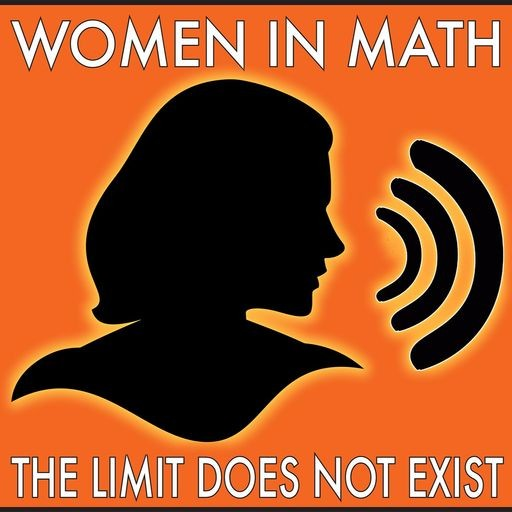Women in math: The limit does not exist (podcast)
Subject: Mathematics
Type: Podcast
Hosts: Various

How long is it?
There are 39 episodes. Episodes can be anywhere between 2 minutes and 1 hour 25 minutes in length, as some are short biographies of female mathematicians, whereas others are conversations.
Is it easy to understand?
No mathematical knowledge is required in order to understand it from a historical perspective, although some episodes include details about mathematical and scientific discoveries.
Who is it for?
It is aimed at anyone who wants to learn more about female mathematicians in history, or what it’s like to be a female mathematician today.
How recent is it?
Women in Math: The Limit Does Not Exist released its first episode in 2016 and its last episode in 2021.
What to expect from Women in Math: The Limit Does Not Exist
Episode 1: Maria Gaetana Agnesi
- What was going on historically in her time
- The impact of the Renaissance on the status of women
- Why she was a child prodigy
- Why she requested to move into a covenant
- What she wrote
- What she ultimately devoted her life to
Episode 3: Emmy Noether
- The challenges she faced
- Why she chose to study mathematics
- Noetherian symmetry and its applications for physics
- Why she is so inspiring
- What work she refused to take credit for
Episode 4: Lene Hau
- How she produced slow light using quantum interference
- High energy electrons and positrons
- The Bose Einstein condensate, the Heisenberg Uncertainty Principle, fermions and bosons
- Schrodinger’s wave equation and the Hamiltonian operator
- How her work applies to computers
Episode 5: Sofia Kovalevskaya
- How she was first introduced to mathematics at a very young age
- The challenges she faced which led her to leave Russia
- How she became the first woman in modern Europe to earn a Doctorate’s degree in mathematics
- Saturn’s rings, elliptic integrals and partial differential equations
- The Cauchy-Kovalevskaya theorem
- What she won for her paper on the rotation of a solid body about a fixed point
Episode 6: Hypatia
- How she was educated
- Her work on conic sections with Apollonius
- Which values she did not allow as answers
- How she taught Neoplatonism
- How she became a symbol of paganism
- How she died
Episode 7: Alice Schafer
- How she discovered her love of mathematics
- What challenges she faced
- How she persevered
- Why she taught until she was 81 years old
Episode 8: Ada Lovelace
- Why she was called ‘the princess of parallelograms’ by Lord Byron
- How she came to understand the ‘analytical machine’ better than her mentor and teacher.
- Why she was so ambitious
- Why she received criticism
- Why she was ahead of her time
Episode 12: Emilie DuChatelet
- How she had learnt 6 languages by the age of 12
- Her study of the conservation of energy
- How her work gave rise to the kinetic energy equation
- ‘The nature of the propagation of fire’
- The works she expertly translated
Episode 13: Katherine Johnson
- What her personality was like
- How she contributed to NASA
- What challenges she faced as a black woman
- How she graduated college at age 18
- What publications she produced
- Why she is so inspiring
- The differences between ambition and passion
Episode 14: Charlotte Angas Scott
- Why her father helped her become educated
- Why she was praised so much
- How her career progressed
- The works she produced
- What her personality was like
Episode 19: Euphemia Haynes
- What she devoted herself to after retiring
- Why she was awarded a medal by a church
- The causes she campaigned for
- Who she left her money to when she died
Episode 20: Marjorie Lee Browne
- Who encouraged her to study
- Why she is so inspiring
- What she will be remembered for
Episode 21: Florence Nightingale
- Why she continued to study mathematics independently after school
- Why she became a nurse
- Why she received an award from Queen Victoria
- How she became a member of the London Statistical Society
- How she used her mathematical knowledge to improve hospitals
Episode 23: Alicia Boole Scott & Mary Everest Boole
- What Alicia is remembered for
- Polytopes and discoveries regarding polyhedral construction
- How Mary taught children
- What Mary’s hobbies and interests were
- Why Mary had a nervous breakdown
Episode 24: Sophie Germain
- How she came across the story of the death of Archimedes
- How she became interested in mathematics
- Why she had to teach herself at first
- Why she tried to hide her identity
- What her greatest contribution to number theory was
- How she contributed to our understanding of elasticity
- Why Gauss was so impressed by her
Episode 25: Evelyn Granville
- Who encouraged her to pursue an education
- How her career progressed
- How she challenged prejudices
- Why she is so inspiring
Episode 28: An interview With Dr. Becky Morgan
- Why she decided to major in mathematics
- Why she decided to get a graduate degree in a different field
- The decision-making process of choosing a major
- Why mathematics is beautiful
- The impact of an instructor on a student’s perception
Episode 29: Maryam Mirzakhani
- Why she decided to go into mathematics
- The long-standing problems she solved
- How her career progressed
- What awards she won
- How she contributed to cryptography, the study of prime numbers and string theory
- Why she is so inspiring
Episode 30: Nola’s Story – A Story of Inspiration
- Why she has always had a special connection with mathematics
- What led her to lose confidence and give up mathematics
- Why she wanted to become a teacher
- How she was impacted by her own self-doubt
Episode 31: Mary Cartwright
- Why she decided to stick with mathematics despite facing disappointment
- Why she began feeling disconnected from her career
- Cartwright’s theorem
- How her career progressed
- How she contributed to radar technology
- The volunteer work she did
- The works she published
Episode 33: An Interview with Dr. Nichole Schimanski
- Why she decided to major in mathematics
- Her experience falling in love with mathematics
- What working in the data science industry is like
- How she is living out her dream
- Her experiences working for different companies
Episode 37: Marie Curie
- Why she became a very serious child and threw herself into her work
- How she studied despite the challenges she faced
- Her contribution to the First World War
- How she won two Nobel Prizes
- Why she is so inspiring
Episode 38: An Interview with Eva Loeser
- What drives her in mathematics
- How to persevere in education
- The importance of community and representation
- How to create a community
- Both the supportive and unsupportive environments for women in the mathematics field at multiple institutions
Episode 39: Donna’s Story
- The challenges she has faced
- How her passion for computer science has grown
- Why the intersection between AI and computer security is important and exciting
- How she has found communities which help her flourish
- What kind of professor she aims to become in the future
My thoughts…
What is the reason for the gender discrepancy in mathematics?
In my opinion, sexism in mathematics is still impacting women and girls today. It takes a lot of confidence to go into a field as competitive as mathematics, but unfortunately, many women and girls only believe in themselves if they think that others believe in them. One reason why women and girls are often less confident in pursuing mathematics might be the underrepresentation of women in the faculty of some mathematics departments, which could lead female students to lean more towards the humanities. As well as this, the idea, or experience, of being one of the only girls in a mathematics class is intimidating for many. Women face many challenges which are not exclusive to the field of mathematics, but I think they affect women in this field more acutely because of its male-dominated history.
